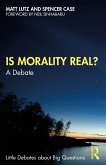In this book, Spencer Case and Matt Lutz debate whether objective moral facts exist. We often say that actions like murder and institutions like slavery are morally wrong. And sometimes people strenuously disagree about the moral status of actions, as with abortion. But what, if anything, makes statements about morality true? Should we be realists about morality, or anti-realists?
After the authors jointly outline the major contemporary positions in the moral realism debate, each author argues for his own preferred views and responds to the other's constructive arguments and criticisms. Case contends that there are moral truths that don't depend on human beliefs or attitudes. Lutz maintains that there are no moral truths, and even if there were, we wouldn't be in a position to know about them. Along the way, they explore topics like the nature of common sense, the meaning of moral language, and why the realism/anti-realism debate matters. The authors develop their own arguments and responses, but assume no prior knowledge of metaethics. The result is a highly accessible exchange, providing new students with an opinionated gateway to this important area of moral philosophy. But the authors' originality gives food for thought to seasoned philosophers as well.
Key Features
Gives a comprehensive overview of all the main positions on moral realism, without assuming any prior knowledge on the subjectFeatures both traditional and original arguments for each positionOffers highly accessible language without sacrificing intellectual rigorDraws upon, and builds on, recent literature on the realism/anti-realism debateUses only a limited number of technical terms and defines all of them in the glossary
After the authors jointly outline the major contemporary positions in the moral realism debate, each author argues for his own preferred views and responds to the other's constructive arguments and criticisms. Case contends that there are moral truths that don't depend on human beliefs or attitudes. Lutz maintains that there are no moral truths, and even if there were, we wouldn't be in a position to know about them. Along the way, they explore topics like the nature of common sense, the meaning of moral language, and why the realism/anti-realism debate matters. The authors develop their own arguments and responses, but assume no prior knowledge of metaethics. The result is a highly accessible exchange, providing new students with an opinionated gateway to this important area of moral philosophy. But the authors' originality gives food for thought to seasoned philosophers as well.
Key Features
Gives a comprehensive overview of all the main positions on moral realism, without assuming any prior knowledge on the subjectFeatures both traditional and original arguments for each positionOffers highly accessible language without sacrificing intellectual rigorDraws upon, and builds on, recent literature on the realism/anti-realism debateUses only a limited number of technical terms and defines all of them in the glossary








